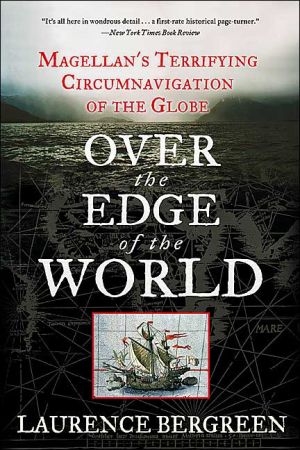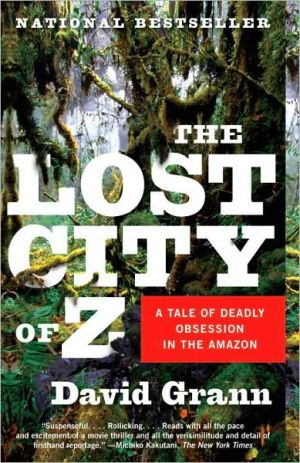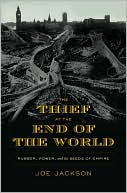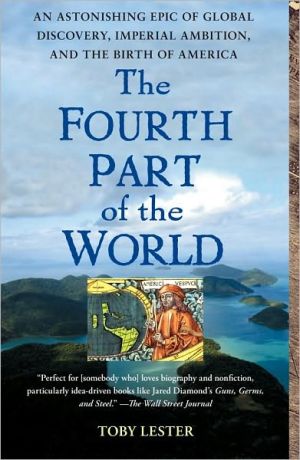Over the Edge of the World: Magellan's Terrifying Circumnavigation of the Globe
Ferdinand Magellan's daring circumnavigation of the globe in the sixteenth century was a three-year odyssey filled with sex, violence, and amazing adventure. Now in Over the Edge of the World, acclaimed author Laurence Bergreen, interweaving a variety of candid, first-person accounts, some previously unavailable in English, brings to life this groundbreaking and majestic tale of discovery that changed many long-held views about the world and the way explorers would henceforth navigate its...
Search in google:
In chronicling the landmark but ultimately fatal voyage undertaken by the Portuguese explorer to find a sea route to Indonesia's Spice Islands from 1519-21, the author of Voyage to Mars: NASA's search for life beyond Earth includes spicy details of the political intrigue and exotic sexual practices encountered. The book includes color plates and endpaper maps. Annotation ©2004 Book News, Inc., Portland, OR The New York Times Prodigious research, sure-footed prose and vivid depictions make for a thoroughly satisfying account of the age in which Iberian seafarers groped their way around the world. Binding it all together is the psychology of Magellan's flawed leadership, the source of constant tension in his fleet. Driven by a fanatical dream to find the Spice Islands, Magellan was a frustrated Portuguese nobleman sailing for the king of Spain and a complicated man with absolute power of life and death over his crew. Almost five centuries after embarking on his world-changing voyage, he emerges here in the hands of a capable biographer who is simultaneously attracted and repelled by his excesses. — W. Jeffrey Bolster
\ New Zealand Herald"A marvelous piece of scholarship"\ \ \ \ \ The New York TimesProdigious research, sure-footed prose and vivid depictions make for a thoroughly satisfying account of the age in which Iberian seafarers groped their way around the world. Binding it all together is the psychology of Magellan's flawed leadership, the source of constant tension in his fleet. Driven by a fanatical dream to find the Spice Islands, Magellan was a frustrated Portuguese nobleman sailing for the king of Spain and a complicated man with absolute power of life and death over his crew. Almost five centuries after embarking on his world-changing voyage, he emerges here in the hands of a capable biographer who is simultaneously attracted and repelled by his excesses. — W. Jeffrey Bolster\ \ \ Publishers WeeklyJournalist Bergreen, who has penned biographies of James Agee, Louis Armstrong, Irving Berlin and Al Capone, superbly recreates Portuguese navigator Ferdinand Magellan's obsessive 16th-century quest, an ill-fated journey that altered Europe's perception of the planet: "It was a dream as old as the imagination: a voyage to the ends of the earth.... Mariners feared they could literally sail over the edge of the world." In 2001, Bergreen traveled the South American strait that bears Magellan's name, and he adds to that firsthand knowledge satellite images of Magellan's route plus international archival research. His day-by-day account incorporates the testimony of sailors, Francisco Albo's pilot's log and the eyewitness accounts of Venetian scholar Antonio Pigafetta, who was on the journey. Magellan's mission for Spain was to find a water route to the fabled Spice Islands, and in 1519, the Armada de Molucca (five ships and some 260 sailors) sailed into the pages of history. Many misfortunes befell the expedition, including the brutal killing of Magellan in the Philippines. Three years later, one weather-beaten ship, "a vessel of desolation and anguish," returned to Spain with a skeleton crew of 18, yet "what a story those few survivors had to tell-a tale of mutiny, of orgies on distant shores, and of the exploration of the entire globe," providing proof that the world was round. Illuminating the Age of Discovery, Bergreen writes this powerful tale of adventure with a strong presence and rich detail. Maps, 16-page color photo insert. (On sale Oct. 14) Forecast: The national broadcast/print campaign will navigate book buyers into stores via a 15-city NPR tour plus a 25-city radio satellite sweep. Bergreen will give a lecture at the American Museum of Natural History in early November, which could generate further interest in this title. Copyright 2003 Reed Business Information.\ \ \ \ \ Library JournalBergreen (Voyage to Mars; Louis Armstrong) applies his successful writing skills to this inside story of what really happened during Magellan's epic, three-year circumnavigation of the globe. On September 6, 1522, of the five vessels that began the historic voyage, only one (the Victoria) sailed into the Spanish port of Sanlucar de Barrameda, holding a mere 18 survivors from the original crew of 260. Bergreen provides a gripping, first-rate story of the harrowing journey, the death of Magellan and nearly his entire crew, and the loss of three of the ships (one had already returned to Spain). Bergreen bases the text on exhaustive research into over 500-year-old original and secondary source documents from five languages, including the extensive eyewitness account by Antonio Pigafetta, the official chronicler of the voyage. Readers will be thrilled by Bergreen's superb, lively writing. The work nicely updates Tim Joyner's ten-year-old Magellan and provides a readily accessible, general history of this important event in world history that will also attract interest in academia. Highly recommended for all libraries.-Dale Farris, Groves, TX Copyright 2003 Reed Business Information.\ \ \ \ \ Kirkus ReviewsA vivid account of Magellan’s star-crossed voyage around the world nearly five centuries ago. Fond of epic adventures and odd ducks alike, Bergreen (Voyage to Mars, 2000, etc.) finds a nice blend of the two in Ferdinand Magellan’s life and career. Considered a tyrant by some, a traitor by others, and often in trouble with one legal authority or another, Magellan seemed driven by a need both to serve the powerful and to make himself rich and/or famous in the bargain; he also had a habit of tripping himself up and making powerful enemies, racking up charges of selling provisions to the Arab enemy in one war and earning mistrust for abandoning his native Portugal for the chance to command an expedition for archrival Spain. Magellan’s skills as a soldier and apparent lack of fear in promoting his aims—if matched by a deeply provisional knowledge of the world beyond Iberia—eventually won him the exclusive contract to find the fabled Spice Islands and claim the lands he found for Christianity and Spain. Thanks to bad luck, poor skills on the human-relations front, and some unfortunate missteps at sea, Magellan found himself confronting near-constant mutinies great and small; he survived them only to die, in 1521, in the Philippines after picking a fight with the natives in a misguided attempt to prove his omnipotence. Bergreen, citing Magellan’s shipmate and chronicler Antonio Pigafetta, suggests that the Captain General’s ever-quarrelsome crew deliberately failed to come to his aid—"or their officers ordered them to stay put," effecting an easily disguised mutiny by another name. Only one of the Magellan armada’s ships made it back to Spain, and 200 sailors died on the voyage.Still, Bergreen writes, the expedition had an important effect not only in pointing the way to the Spice Island trade, but also in dispelling reigning myths about "mermaids, boiling water at the equator, and a magnetic island capable of pulling the nails from passing ships." Very nicely written through and through, and a pleasure for students of world exploration. Agent: Suzanne Gluck/ICM\ \







